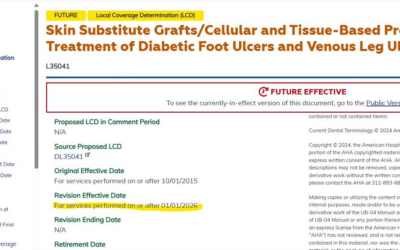Probably not, but it depends.
Some providers dispense surgical dressings to patients and submit coding for the dressings to third party payers in exchange for payment. A commonly dispensed surgical dressing is collagen, which attracts monocytes and fibroblasts to a wound bed, enhancing cellular migration and wound contracture.
Coverage of surgical dressings, like collagen, for Medicare beneficiaries is governed by the Durable Medical Equipment Medicare Administrative Contractor (DMEMAC) Surgical Dressings Local Coverage Determination (LCD), L338311. This LCD states collagen is covered when medical necessity is documented and one of the following criteria exist:
- full thickness wounds (e.g., stage 3 or 4 ulcers)
- wounds with light to moderate exudate
- wounds that have stalled or have not progressed toward a healing goal
Any Wounds With Light To Moderate Exudate?
No. Light to moderate exudate alone does not qualify for coverage of collagen because, as is the case any time coding is submitted for payment, coverage is dependent upon medical necessity. To substantiate coverage, the nature of the wound and the documentation must support the need for the surgical dressing. A fresh, normal post-elective procedure site in an uncompromised patient that is progressing as expected does not demonstrate the medical necessity for coverage of collagen.
What’s the Exception?
When a procedure is performed on a compromised patient, collagen may be indicated immediately postoperatively. In this situation it is important to document the compromised nature of the patient and why their healing potential may not be ideal. It would also be important to document why the decision to perform the procedure was made. Another situation when collagen postoperatively may be medically necessary is a postoperative site that is not progressing as expected.





